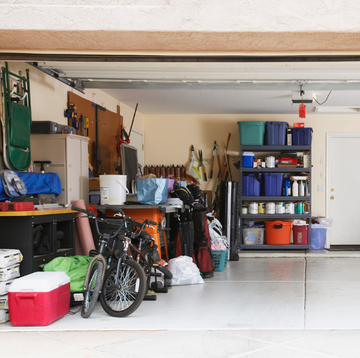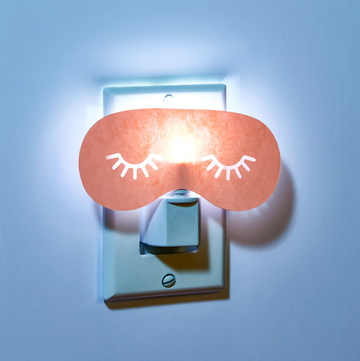When I was a teen, my bedroom was constantly a mess. Everything was everywhere, save for a tidy little path carved out so I could get to my closet, my desk and into bed. Of course, like most teenagers who don’t want to clean their rooms, I told my parents it was “organized chaos”: "Yes, I know where my math book is — it’s right there under that leaning tower of socks, papers and magazines!"
But let’s be real — I didn’t really know where anything was. It took me at least 10 minutes to find any item in the turmoil of my bedroom. Also, I was hesitant to have friends over, lest they see how messy I was.
When I moved out on my own, I didn’t want that mess — or that reputation — to follow me. So I turned over a new leaf, creating a very organized life in which everything had its place and it was all easy to find. Doing that kind of “cleaning 180” isn’t uncommon, says Gail Saltz, M.D., a clinical associate professor of psychiatry at the NewYork–Presbyterian/Weill Cornell Medical Center and host of the podcast “How Can I Help?"
“Being at home is regressive, where you remain the child and your mom will clean up after you, even if you aren't aware of that feeling,” she said. “When you are on your own, you feel more independent and like you are personally responsible for your stuff. This catapults many who were slobs before to become neat as a reflection of feeling the need to be a successful adult.”
But soon enough, the cracks in my cleaning method began to show. My bathroom counters started getting gross because, although I wiped them down, I didn’t move the stuff on them to get underneath. I swept but never mopped my floors. And I never, ever dusted. Also adding to the issue? My newly acquired husband. Clutter doesn’t bug him as much as it does me, so I spend a lot of time decluttering for both of us. On top of that, we both work full-time and generally despise deep cleaning, so we don’t prioritize it.
After probably the 20th time of our looking around and saying “We should probably dust” but never getting around to it, we made a decision that not only makes the house sparkle but also has done wonders for my mental health and my marriage: We hired a house cleaner. One glorious time a month, an angel with a mop and a sponge descends, leaving behind nothing but clean surfaces and a bubble or two.
A clutter-free mind
One of the biggest gifts of the cleaning service is the removal of clutter. My personal mantra (seriously) is Physical clutter causes mental clutter. If I look around and see that things are messy or disorganized, I struggle to concentrate, not just because I’ll be constantly reminded that I need to clean but also because I start to feel out of control. Being around clutter and deeper messes overwhelms me. And I’m not the only one.
“For some people it does feel like it’s the reflection of ‘My life feels messy, my life has an endless to-do list and my life feels disorganized,’” said Dr. Saltz. “Having an environment that is clean and organized gives a lot of people relief.”
Not cleaning can create a vicious cycle too. When you’re overwhelmed and stressed in general, things like clearing up clutter, dusting and mopping can fall by the wayside, Dr. Saltz says. But when all that dirt and clutter adds up, it can make you feel even more stressed.
“If it’s dirty and it needs to be cleaned but that’s on a long list and it stays on the list, you never feel the release of ‘It’s done,’ ” says Dr. Saltz. “It’s a reflection of being overwhelmed, and unfortunately that can often make you feel even more overwhelmed as you just live in it and look at it.”
Enter the house cleaner; exit the clutter. After she leaves and in the weeks that follow, I feel lighter, more focused and less stressed. I walk around taking deep breaths of fresh, clean air and just feel better. It makes sense — regular cleaning improves the air quality in your home, which helps mitigate allergy symptoms related to dust and dander, according to Harvard Medical School.
An unmessy marriage
In a completely unscientific poll taken just before I wrote this, I asked my husband which cleaning tasks I harped on the most. Apparently I’m very vocal about his leaving dirty socks out and not wiping the counters. Well, guess what? We clear away the socks before our cleaner comes, and the cleaning person tackles the counter mess so no gunk builds up under our olive oil bottles and on the toaster. That leads to less “reminding” from me and less arguing about household tasks overall.
“Let’s face it, no one ever feels sexy or amorous when they’re cleaning up their partner’s mess or doing a deep clean of the house,” says relationship expert Nicole Moore. “If anyone feels like they’re scolding or being scolded, that’s a sure sign that hiring a cleaner would help.”
It’s also a time saver. You can use the hours when the cleaner is there to spend quality time together instead of arguing over who should conquer the toilet. (Which certainly shouldn’t be you, am I right?)
“Time is valuable, and it’s important to allocate it to the things that matter most to you, such as investing in your relationships,” says Reena B. Patel, a psychologist and a certified behavior analyst. “Think of it as buying time. You can spend money to buy back the time you would have spent cleaning.” Agreeing to hire a cleaner is a great way for you and your spouse to care for each other.
Of course, hiring a cleaner is a possibility only if you’re in a position to pay for one. I pay mine $100 for each visit, and it takes her, working alone, about two hours. That’s on the low end of average. Angela Brown, CEO of Savvy Cleaner, a training program for house cleaners and maids, says the average cost is $50 to $75 per hour per cleaner. Alicia Sokolowski, president and co-CEO of AspenClean, adds that the total cost for one cleaning ranges from $150 to $500, but both note that costs can vary based on location, the number of people living in a home, house size and the type of cleaning needed.
“Obviously some people can’t afford it,” Dr. Saltz said. “If you are so fortunate as to be in that place of privilege, many people do find that it removes a source of arguing and unhappiness in the dynamic at home.”
How to find the right cleaner for you
My mental health and my marriage benefited from the hiring of a professional house cleaner — maybe yours will too! First, decide how often you want your space cleaned. Monthly is great for us, but some prefer it more often.
Experts Brown and Sokolowski suggest scheduling a walk-through with the prospective cleaner before you hire them. They’ll be able to point out any areas that need special cleaning and suggest how often you might need them (frequency depends on multiple factors, including how many people there are to make a mess, how clean you want your home to be and how long it will stay that way).
A few more get-tidy tips:
- Ask for recommendations. If you have friends or family members who user cleaners, ask them how they like theirs and if they can share contact information. You can also ask in neighborhood social media groups — that's how I found mine.
- Inquire about prices and process — and have a budget in mind. Plan on about $150 per visit, depending on where you live; it may be more expensive in cities than in rural areas. Brown suggests asking if the cleaner carries liability insurance. Ask about anything specific you might need cleaned that could be unusual — like a dog’s potty pad area or a cat’s litter box, a back deck or dishes — and if there’s anything they won’t clean.
- Ask about allergies. We have a dog and a cat, so obviously, a cleaner who was allergic to those pets couldn’t be a good fit for us.
- Whittle down your list and ask the finalists for references. Make sure you can find someone to vouch for this stranger you’re about to let into your home. Talk to their references and get their opinion on how well the cleaner does. Brown and Sokolowski both suggest being wary of cleaners who won’t provide references or who have bad reviews — those are big red flags that the person may not be trustworthy.
- Choose your cleaner — but remember, you can change your mind. If you don’t like the job they did or you didn’t feel safe with them in your home, move on to the next person on your finalist list. It’s incredibly important to feel comfortable with the person who is cleaning your house, because they’re going to be in your space. “Typically professional cleaning services have a thorough employee vetting process to ensure the reliability and trustworthiness of their staff,” Sokolowski says. “This process may include background checks, reference checks and interviews to assess an applicant’s qualifications and character. Some cleaning companies may also verify previous employment history. If you are still concerned about the people coming to your house, it’s a good idea to inquire about the vetting process.”
- Pay it forward. If you are in a position to afford a cleaner, consider giving a harried friend or loved one the gift of a session with your service. Think of it as spreading the joy of stress relief and the ability of spouses to coexist peacefully.

Jennifer Billock is an award-winning writer, bestselling author, and editor of the Kitchen Witch Newsletter. She is currently dreaming of an around-the-world trip with her Boston terrier. Check out her website at jenniferbillock.com.















